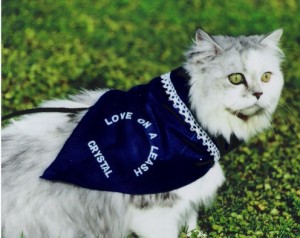 Could your cat become a service animal? While many professionals discount the idea of cats being trained as service animals, some seem to come by it naturally. Believe it or not, cats have been known to alert their owners when a seizure is coming on or when there’s a change in their blood glucose level. Some cats react by simply lying on their owner, pawing at or licking their face, or dancing around them indicating something is wrong. I’ve heard of cats who pointed out a problem by showing a lot of attention to an area of their human’s body—pawing at or lying where a cancer is growing, for example.
Could your cat become a service animal? While many professionals discount the idea of cats being trained as service animals, some seem to come by it naturally. Believe it or not, cats have been known to alert their owners when a seizure is coming on or when there’s a change in their blood glucose level. Some cats react by simply lying on their owner, pawing at or licking their face, or dancing around them indicating something is wrong. I’ve heard of cats who pointed out a problem by showing a lot of attention to an area of their human’s body—pawing at or lying where a cancer is growing, for example.
Some people with emotional issues or sleep disorders claim their cat provides a great deal of comfort during their times of distress. And we’ve all heard of cats who have saved their family in an emergency. But can you teach a kitten to use the telephone? Some people claim you can. We used to have a cat that would knock the phone off the hook when we weren’t home to take a call. She evidently heard my voice on the answering machine and was trying to find me in the phone.
While the jury is still out as to whether a cat can be trained as a bona fide service animal, we do know that some cats make excellent therapy animals. I used to take kittens into nursing homes for the pleasure and comfort of the residents. But this wasn’t ideal. Kittens can be pretty rambunctious. The best therapy cats are friendly, quiet, calm, and adaptable. I’ve known such cats, but I’ve never owned one. One big ragdoll cat used to ride over his owner’s shoulder as he walked around the neighborhood each evening. A silver-shaded Persian has what it takes to calm and please the elderly and the ailing. She even has her own therapy cat vest.
Do you have a therapy or service cat or one who could easily become such a cat? I’d love to hear your story.





